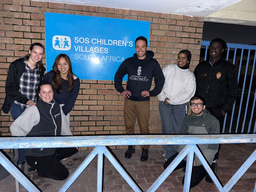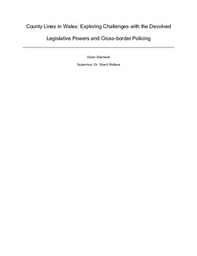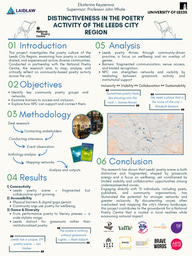[Leadership Video] On Community and Being a Leader in a Post-Pandemic World
[script]
Hello, my name is Toni Andres and I am a scholar of the 2021 Laidlaw cohort. I am also entering my fourth year of a joint degree in Classics and Comparative Literature at the University of St Andrews.
Why I applied
Originally I applied for the Scholarship Programme for the unique opportunity to conduct my own research project. When would a second-year undergraduate student ever get that chance? Leadership on the other hand was something abstract that I had not proactively or consciously thought about in any way before. To be honest, I associated the term leadership with corporate jargon, prestige and iconographical celebration of hero-figures. Or, in other words, a concept that was very far from my lived day-to-day experience.
What I’ve gained
During my time as a Laidlaw scholar my relationship with the term ‘leadership’ changed fundamentally. My journey with that term is deeply connected to my experiences of community – or rather, absence of any community at the time when I applied in 2021. The COVID-19 pandemic was at its peak, and time and space seemed frozen. Community seemed just as abstract to me as leadership. Under these circumstances, my first experiences of being a Laidlaw scholar took place exclusively online. The members of my cohort were merely digital tiles on my laptop screen as were the presenters during the Laidlaw summer programme during the first part of my Laidlaw Scholarship. We really tried to make it work and in retrospect I am convinced that we did our best. But I am afraid there is only so much we could do against the Zoom fatigue at that point.
This however meant that I had to process the input we received on leadership in a way that made sense to me at this time of utter isolation. As part of my research project on queer adaptations of poems by the ancient Roman poet Catullus I set up an online, collaborative arts project entitled Catullan Identities that encouraged people to submit creative adaptations of the ancient poems. In this way, I hoped to create a gallery of unique voices connected through Catullus. The positive feedback I received and connections I found through this project encouraged me to take this project a step further in my second summer of the Laidlaw Scholarship Programme. As opposed to the online project in the previous year, I organised workshops in different parts of Scotland on Catullus’ poems in order to bring people physically together through discussions of the poems specifically through a queer lens. At the end of this series of workshops, I collaged all the adaptations that were created during the workshops into a zine so all participants of all workshops could see their own pieces of art as part of a community of Catullan Identities.
Organising venues, getting in touch with all the people who would be involved in the organisation of this, advertising and organising the workshops was genuinely one of the hardest things I’ve ever done. And yet, the reward of creating and being part of a community in person was the most rewarding experience I could have imagined after those many months online. During this time, my definition and relation to leadership changed from one of distant unrelatability to one that embraces courage, determination, appreciation and takes responsibility – for what community means, in my case.
Leadership is about stepping out of your comfort zone. It’s about finding support and appreciation in a community. It’s about sourcing and channeling mutual inspiration. Leadership outweighs situational discomfort against the larger goal of tieing a safety net of solidarity. It means that we sometimes have to start from scratch again and again in order to let ourselves be immersed in new perspectives and approaches. In this way, being a leader is about embracing a set of values that are built on mutual appreciation and inspiration. It also means that leadership permeates every social interaction.
Future and Thanks
That being said, being a leader for me means to be an active member of the Laidlaw community. I hope to give back the appreciation and the support that enabled me to go on this journey and to benefit so greatly from this unique programme. I am very happy to be contacted with any questions and to provide support.
Finally, I would like to express my sincerest gratitude to the Laidlaw Foundation and especially Lord Laidlaw for their generosity and infinite support throughout my time as a scholar. This would not have been possible without their guidance, advice, and commitment to each individual scholar. I cannot emphasise how grateful I am for this incredible opportunity. Thank you.
[script end]
If you are interested in my project, please feel free to browse through the gallery of Catullan Identities or check out the latest news via Social Media:
- Instagram @catullani
- Twitter @catullani
- Facebook @Catullan Identities
Please feel free to get in touch about my projects or to share your thoughts on community organisation and building!





Please sign in
If you are a registered user on Laidlaw Scholars Network, please sign in